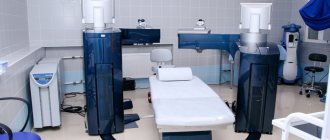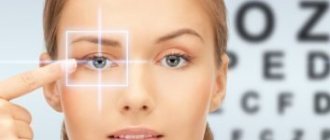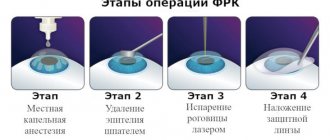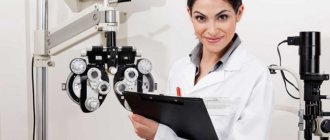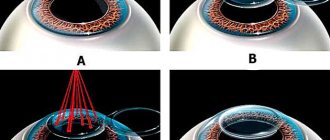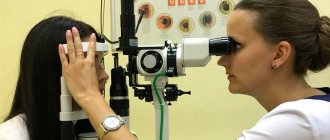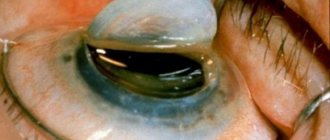Laser correction is a safe and highly effective method of vision restoration. Every year, more than three million operations are performed around the world to get rid of wearing glasses. People are no longer wary of this kind of intervention, seeing their effectiveness. Unfortunately, this method of vision correction is not suitable for everyone.
Laser vision correction is a set of techniques, the indications and contraindications for which depend on the age and health of the patient. The principle of laser vision correction is to correct the cornea and create optimal conditions so that the refracted beam of light is focused directly on the retina. When exposed to the cornea, the laser evaporates its thinnest layer, so before surgery, patients must undergo a full ophthalmological examination, which allows them to obtain accurate data on the state of the visual system. If all indications are normal, you can choose your preferred date for the procedure, and then forget about myopia, astigmatism and farsightedness for many years.
Indications for laser vision correction
Who is recommended for laser correction? For those who do not tolerate vision correction with contact lenses and glasses, people with myopia and farsightedness who lead an active lifestyle. The operation is especially effective for patients with severe astigmatism, a large difference in the amount of myopia or farsightedness between the eyes. It is recommended to get rid of glasses and contact lenses for people whose refractive errors prevent them from fully performing their professional duties: firefighters, police officers, military personnel, those who work with small parts and hazardous substances.
Diagnosis before surgery:
- refractometry for a narrow and wide pupil;
- biometry of the eye to determine its length and the size of intraocular structures;
- tonometry - measurement of intraocular pressure;
- visometry is a method that determines visual acuity;
- wavefront analysis aimed at studying higher order aberrations;
- examination of the fundus - this examination may reveal dangerous retinal tears that prevent the procedure from being carried out at this stage;
- keratometry - determination of the curvature of the cornea and its topography.
After the diagnosis, the doctor chooses the optimal method.
Thus, Lasik laser vision correction is indicated for patients with low and moderate myopia, in the absence of retinal pathologies, and the LASEK procedure is selected by a specialist if the patient has a high degree of myopia, a thin cornea, or there are dystrophic changes in the retina.
Unfortunately, in addition to the indications, there are also contraindications for laser vision correction.
How do they check?
Preparatory stage
Before the procedure, it is advisable not to wear lenses for a couple of days.
In order for corneal pachymetry to proceed without complications and accurate results to be obtained, ophthalmologists focus on following the following rules:
- It is necessary to stop wearing optical and decorative lenses 2 days before the examination.
- When collecting anamnesis, it is imperative to report individual drug intolerance. The reaction to local anesthetics and antiputrefactive agents is especially important.
- You must come to the procedure without any traces of makeup or medicinal cosmetics. Decorative eye cosmetics are completely excluded 2 days before the study.
Ultrasound pachymetry
The technique involves direct contact of the device with the mucous membranes of the eyes. The subject takes a horizontal position, and the local anesthetic drug Inocaine is instilled into the organ of vision. The ophthalmologist carefully moves the nozzle from the ultrasound machine along the cornea. It is important that the procedure is performed by an experienced doctor who applies minimal pressure to the outer part of the eye. Excessive pressure causes injury and poor results.
The data is automatically processed, calculated and displayed on the monitor. To prevent infection, after the examination the mucous membranes of the eyes are treated with antibiotics. The most effective medications include Tsipromed and Albucid. After instillation, it is recommended to close your eyes for 2-3 minutes. and gently massage the eyelids so that the antibacterial substance is evenly distributed throughout the mucous membranes.
Optical pachymetry
The study is carried out by enlarging the cornea with a special device.
The examination takes place without direct contact with the eyes using a special apparatus, thanks to which the cornea is examined under multiple magnification. An attachment made of 2 parallel pieces of glass, fixed to the slit lamp, makes it possible to measure the diameter of the cornea and its thickness. The subject sits on the side of the device and places his chin on the stand. In this case, the ophthalmologist is on the opposite side of the lamp to examine the cornea. To determine the parameters, the doctor, using a lever, rotates the upper lens and directs light to the lower one. Indicators are assessed using a measuring ruler.
In the absence of the necessary medical equipment or diagnosing contraindications for examination, you can examine the eyes with a coherent apparatus to obtain a tomogram.
What are the contraindications to laser vision correction?
Restrictions that prevent the procedure from being carried out can be absolute or relative. Relative contraindications to laser vision correction are temporary obstacles that can be eliminated. Thus, temporary restrictions include inflammatory diseases of the eyelids, cornea and conjunctiva in the acute stage. Among the absolute contraindications:
- age up to 18 years - the limitation is due to the fact that the organs of vision continue to grow, their structure changes, so the method cannot guarantee a sustainable result;
- pregnancy and lactation;
- epilepsy, mental disorders and some systemic diseases;
- pronounced nystagmus of the eyeball, cataracts, glaucoma, keratoconus;
- diagnosed retinal detachment;
- diabetes mellitus, presence of a pacemaker;
- thin cornea - in this case it is possible to correct vision using the Femto-Lasik method;
- dry eye syndrome - after surgery, unpleasant symptoms may intensify.
Laser vision correction for women—what are the contraindications to surgery?
Absolutely, this kind of intervention cannot be carried out during pregnancy and lactation. After completing breastfeeding, at least six months must pass.
Only after this can you contact an ophthalmologist for a full diagnosis. During this period, women's hormonal levels change, which can negatively affect healing.
What other contraindications exist? For example, poor vision with severe myopia - above 10.0 - 12.0 diopters - can also become an obstacle to surgery, because with such data, laser correction will not be able to restore vision to optimal levels so that the patient takes off his glasses. That is, even after the operation you will have to wear them. In this case, patients are recommended alternative routes. For example, implantation of an intraocular lens. Surgery cannot be performed if a person has only one eye.
What is the cornea?
When choosing a method for examining the cornea, it is recommended to give preference to the ultrasound contact technique, as it gives more accurate results. The risk of bias is minimal, but it is important to review additional contraindications.
The outer part of the eyeball, responsible for the refraction of artificial and natural light, is similar in shape to a lens. Ophthalmologists evaluate the condition of the cornea by thickness, diameter, radius of curvature and refractive power. To identify deviations, you need to contact an ophthalmologist. Intraocular pressure indicators depend on the thickness of the cornea. Disturbances in the cornea provoke serious pathologies that lead to the following negative symptoms:
If the thickness of the cornea is incorrect, double vision appears.
- blurred vision;
- complete or partial loss of visual abilities;
- doubling of objects;
- attacks accompanied by nausea and vomiting;
- loss of the eyeball;
- frequent headaches.
What contraindications to laser vision correction can be eliminated?
One of the temporary limitations to laser vision correction is the rapid progression of myopia and hypermetropia - in this case, it will be necessary to undergo a therapeutic course prescribed by an ophthalmologist. Once the process has stabilized, you can begin preparing for laser vision correction. The same applies to various ailments such as conjunctivitis, blepharitis, stye - they can only delay surgery for a while.
If retinal pathologies were identified during diagnosis, the operation should be postponed. Dystrophic changes, depending on the condition, may become a temporary obstacle to the procedure.
In this case, the patient is recommended a laser coagulation procedure, which prevents the progression of the disease and strengthens the retina. Once the patient's condition has stabilized, laser vision correction can be considered.
Limitations and contraindications after laser vision correction
Are there any contraindications after laser vision correction? Yes, there is, although the recovery period is short. Already a month after the operation, you can resume fitness classes and perform physical exercises. During the first week of rehabilitation, it is recommended to wear sunglasses to prevent bright ultraviolet rays from affecting the cornea. The restrictions also include the use of digital technology with screens: smartphones, tablets, laptops.
Particular care should be taken during morning and evening washing. You should not visit the sauna, swimming pool, or use cosmetics.
A calm lifestyle in the first week after laser vision correction is the key to rapid healing.
Sometimes the doctor recommends that patients drip an anti-inflammatory drug into their eyes for several days. In the future, for people who have undergone this kind of intervention, there are no restrictions regarding physical activity.
Examination and preparation for surgery
A week or two before the examination, it is necessary to avoid wearing contact lenses. This time should be enough to restore the natural shape of the cornea, which changes under the influence of lenses.
In addition to an identification document, it is necessary to have the results of a comprehensive examination of a blood sample previously conducted in the laboratory. In particular, we are talking not only about a general blood test, but also a detailed blood test to detect HIV, RW, hepatitis B and C.
48 hours before the operation, you must completely eliminate the use of alcoholic beverages, and the day before the operation, stop using decorative cosmetics and perfumes.
It is recommended to wash your hair on the day of surgery, as you will not have to do this for the next few days after surgery. You should also avoid wearing high-neck woolen sweaters.
Can laser correction negatively affect visual acuity?
The main concerns of patients who decide to undergo surgery are distrust of the technology. Many are afraid that the lights will be turned off during manipulations, and without equipment the doctor will not be able to complete the correction process. That the specialist will miss, and the laser will not be able to accurately create the profile of the cornea, and this will lead to loss of vision or a significant decrease in its acuity.
Fortunately, thanks to the use of precise modern equipment, the human factor is minimized, and if there are interruptions in the power supply to the equipment, electricity generators are used.
During the procedure, the eyes are fixed with a special vacuum ring, and the head is fixed with a vacuum pillow, so no displacements will occur. But a person who chooses laser correction will soon appreciate all the benefits of living with maximum visual acuity.
